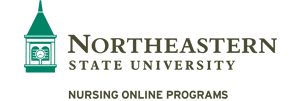Nursing programs accredited by the Accreditation Commission for Education in Nursing (ACEN) voluntarily meet a set of rigorous educational standards verified through a peer-review process. ACEN accreditation signals a nursing school’s commitment to educational excellence. Northeastern State University’s online Registered Nurse to Bachelor of Science in Nursing (RN to BSN) program is ACEN-accredited, so nurses enrolling in the program can expect an education that meets the ACEN Standards and Criteria. This accreditation also ensures that the school’s excellence is verified by peers and information about graduate success is available to the public.
ACEN accreditation can make a difference for the community — nurses can get the credentials they need, nursing schools can reach their program goals and patients benefit from the improved care BSN-prepared nurses provide. The accreditation process is thorough and uses peer evaluation to help schools identify their strengths and areas that need improvement.
What ACEN Accreditation Means for Students
The ACEN standards bring consistent quality to nursing education. State, federal and other requirements for nursing programs may differ tremendously, but ACEN standards are the same for every school that applies for programmatic accreditation. Some states, federal agencies and other organizations require graduation from an accredited program for nurse licensure. Certain types of financial aid are only available to students attending accredited institutions.
Plus, employers may choose to only hire nurses from accredited programs. Many employers offer education incentives like tuition reimbursement for nurses to advance their training and credentials. Yet these employers may stipulate that the incentives can only be applied toward accredited program expenses.
The ACEN is recognized by both the U.S. Department of Education (USDE) and the Council for Higher Education Accreditation (CHEA), demonstrating the quality and rigorous standards of ACEN accreditation. The ACEN serves as a peer-driven accreditation body for nursing programs of all types.
As such, this organization provides the accreditation standards that help protect students and ensure that the degrees earned by graduates have a meaningful impact on career advancement and job prospects. Prospective students can access graduate employment data and see how well the program prepares students to advance as nurses.
How Programs Become ACEN-Accredited
The process for ACEN accreditation is outlined in the ACEN 2023 Accreditation Manual for Nursing Education Programs. Initially, nursing programs start with the Candidacy process. Once Candidate status is achieved, each program must prepare a Self-Study Report to demonstrate compliance with the ACEN Standards and Criteria. A site visit follows the submission of the Self-Study Report, wherein peer evaluators assess the program’s compliance with the ACEN Standards and Criteria. These peer evaluators document and submit their recommendations regarding accreditation in a Site Visit Report.
An independent Evaluation Review Panel then examines both the Self-Study Report and the Site Visit Report and makes their own recommendation regarding accreditation. Finally, the ACEN Board of Commissioners (BOC) reviews the entire accreditation process and recommendations in order to reach their ultimate decision regarding full program accreditation.
If the school continues to uphold ACEN criteria, accreditation can be maintained through repeating the entire accreditation process (except the initial Candidacy process) at specified intervals. Accredited schools receive occasional site visits, as well.
What Do Peers Evaluate During a Program Site Visit?
During a site visit, peer evaluators meet with faculty members, administrators, nursing students, members of the public and others as appropriate for the evaluation. Evaluators also tour the school’s facility and classrooms. The curriculum is examined for quality, relevance and completeness. Student, faculty and graduate records are reviewed as necessary. A crucial component of the site visit is to determine if the practices of a nursing program align with the program’s Self-Study Report — as well as the ACEN Standards and Criteria.
All of the information provided by the school and the insights and recommendations of the peer evaluation team are reviewed and assessed independently by both the Evaluation Review Panel and the ACEN BOC, resulting in the decision of whether to accept or reject accreditation for the nursing program. This thorough, multi-step process ensures ACEN accreditation represents the highest standard of quality in nursing education. Maintaining accreditation demonstrates continued commitment to the ACEN’s standards, mission and goals for nursing education.
ACEN accreditation can help nursing schools highlight the quality of their programs. For prospective students, choosing an accredited school may provide career benefits and a high-quality education. Becoming accredited by the ACEN involves a specific process of site visits by peer evaluators and reviews of every aspect of the academic program — curriculum, faculty, governance, graduate records, student progress and other factors. A school receives accreditation based on its ability to meet the ACEN standards. To maintain accreditation, the school must continue to meet or exceed these requirements.
Learn more about Northeastern State University’s online RN to BSN program.


